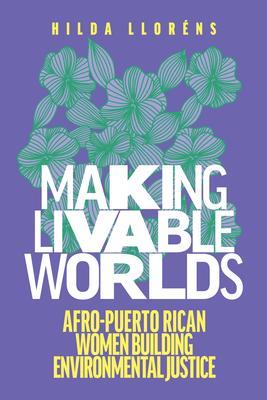Winner of the 2022 Frank Bonilla Book Award, sponsored by the Puerto Rican Studies Association
Winner of the 2022 Gregory Bateson Book Prize, sponsored by the Society for Cultural Anthropology
Brings to life Afro-Puerto Rican women's creative struggles for environmental justice
When Hurricanes Irma and Mara made landfall in Puerto Rico in September 2017, their destructive force further devastated an archipelago already pummeled by economic austerity, political upheaval, and environmental calamities. To navigate these multiple ongoing crises, Afro-Puerto Rican women have drawn from their cultural knowledge to engage in daily improvisations that enable their communities to survive and thrive. Their life-affirming practices, developed and passed down through generations, offer powerful modes of resistance to gendered and racialized exploitation, ecological ruination, and deepening capitalist extraction. Through solidarity, reciprocity, and an ethics of care, these women create restorative alternatives to dispossession to produce good, meaningful lives for their communities.
Making Livable Worlds weaves together autobiography, ethnography, interviews, memories, and fieldwork to recast narratives that continuously erase Black Puerto Rican women as agents of social change. In doing so, Llorns serves as an "ethnographer of home" as she brings to life the powerful histories and testimonies of a marginalized, disavowed community that has been treated as disposable.

Making Livable Worlds: Afro-Puerto Rican Women Building Environmental Justice
Winner of the 2022 Frank Bonilla Book Award, sponsored by the Puerto Rican Studies Association
Winner of the 2022 Gregory Bateson Book Prize, sponsored by the Society for Cultural Anthropology
Brings to life Afro-Puerto Rican women's creative struggles for environmental justice
When Hurricanes Irma and Mara made landfall in Puerto Rico in September 2017, their destructive force further devastated an archipelago already pummeled by economic austerity, political upheaval, and environmental calamities. To navigate these multiple ongoing crises, Afro-Puerto Rican women have drawn from their cultural knowledge to engage in daily improvisations that enable their communities to survive and thrive. Their life-affirming practices, developed and passed down through generations, offer powerful modes of resistance to gendered and racialized exploitation, ecological ruination, and deepening capitalist extraction. Through solidarity, reciprocity, and an ethics of care, these women create restorative alternatives to dispossession to produce good, meaningful lives for their communities.
Making Livable Worlds weaves together autobiography, ethnography, interviews, memories, and fieldwork to recast narratives that continuously erase Black Puerto Rican women as agents of social change. In doing so, Llorns serves as an "ethnographer of home" as she brings to life the powerful histories and testimonies of a marginalized, disavowed community that has been treated as disposable.